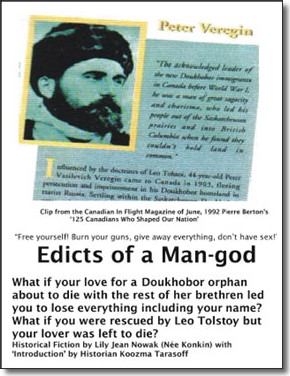New historical fiction about Doukhobors
Nowak, Lily. Edicts of a Man-godVictoria, British Columbia: Trafford Publishing, 2006, 378 pp. ISBN 1-4251-0711-7.
Read free online at the Internet Archive with free account.
Introduction
by Koozma J. Tarasoff
Lily Konkin-Nowak's Edicts of Man-god is a historical fiction of human tragedy and joy, of love and sorrow, of exile and supreme courage, all set some 125 years ago on the Ghengis Khan bottleneck of Transcaucasia and Turkey. Being a novel with historical roots, the story deals centrally with a pacifist group called Spirit-Wrestlers, or Doukhobors.
Nowak, whose ancestors are Canadian Doukhobors, is author of this her first novel. Her heroes are Anton, a Cossack soldier, and Elena, an orphan from Sirotskaya. With sensitivity, Nowak portrays the challenge of survival in extreme conditions of inhumanity including rape, torture, and exile. The passion of sex rides high in cowboy style as macho men take advantage of women in frontier conditions while a few pursue true love. Bokin, the devil incarnate, like Rasputin, lurks in the shadows, as the author brings this cliffhanger drama to a climax.
For me a historian and writer on the Doukhobor theme for a half a century, Lily Nowak's story is familiar and closely reflects the historical facts and spirit of the times. She has done her homework well. Her characters are well crafted and her plots move the reader along quickly creating a colourful canvas emitting strong emotions. As an author, Nowak brings freshness to the palette of discriminating readers.
This book inspires me to share some of my thoughts on the Doukhobors. Today the largest number residing outside the homeland is in Canada, which has a Doukhobor population of 40,000. There is about the same number in Russia and the former Soviet Union. In USA there are about 500. Although comprising elements of religion and a distinct way of life, today Doukhobors might best be described as a social movement characterized by love, human goodness, and justice.
It is noteworhty to discover that early leader Ilarion Pobirokhin in the 1700s succumbed to the notion of Kings, Queens, and Popes to see himself as claiming a primogeniture right to some higher connection to God. His intent was power, similar to the takeover of Christiandom by Emperor Constantine I. It was early in the 4th century AD that Constantine robbed millions of people from pursuing the spark of God within each person and instead established a Church and a 'permitted' religion vested in one institution residing in Rome. For the Doukhobors in the novel, the power rests in Sirotskaya (Orphans Home administration centre of the leaders) which is analygous in function to the spiritual centre of Rome.
This power quest was and is contrary to the Doukhobor principle of equality. For them, the concept of the God Within is central to their philosophy of love and equal humanity. To court the notion that one individual is superior to another one based on ancestry, material wealth, or other advantage is not in keeping with the spirit of the group. With enlightenment and the development of a democratic society, more and more Doukhobors recognize the aberration of the past and have begun to search for the freethinking spirit of their early roots.
Koozma J. Tarasoff
Published author*
February 26, 2005
* Tarasoff is an authoritative world scholar on the Doukhobors with over 50 years of research. Amongst his dozen books, Tarasoff's latest is Spirit Wrestlers: Doukhobor Pioneers' Strategies for Living (Ottawa, Ontario: Legas and Spirit Wrestlers Publishing, 2002). This book in full colour, 500 pages, and 700 select images draws on the stories of the Doukhobor pioneers from the time of Lev N. Tolstoy to the present. See www.spirit-wrestlers.com

| About the Book Doukhobors, genocide, love, death, murder, gods, fiction, free ethnic recipes; Tolstoy rescues thousands condemned to die for obeying Peter but Pierre Berton says Peter Verigan is one of 125 most important Canadians! What if you were ordered to give away everything you own, abstain from sex and show the Tsar you will not fight in his army by burning your guns? Peter Verigan issues these deadly edicts to his Russian Doukhobor followers whose obedience is fatal. When a Cossack soldier named Anton is sent to punish these pacifists, he risks his life to save his beloved Elena instead but betrayal sees him exiled to Canada and Elena held captive in Siberia. Edicts of a Man-God shows the murderous treachery that compelled Tolstoy to rescue thousands of lives condemned to death by the Tsar. Survivors settle in Canada and Pierre Berton says Peter Verigan is one of 125 important citizens who helped shape Canada. About the Author I became a teacher in Toronto and later worked for the Federal government until I retired. The gripping story of the events that led thousands of Russians to become Canadians has always fascinated me. It is a riveting account that makes one wonder at the strength and courage of all those daring to make foreign shores their new home. Read free online at the Internet Archive with free account. Read a 6-page excerpt from this book. See Nowak's website. E-mail Lilly Konkin-Nowak <ljnowak@shaw.ca> |